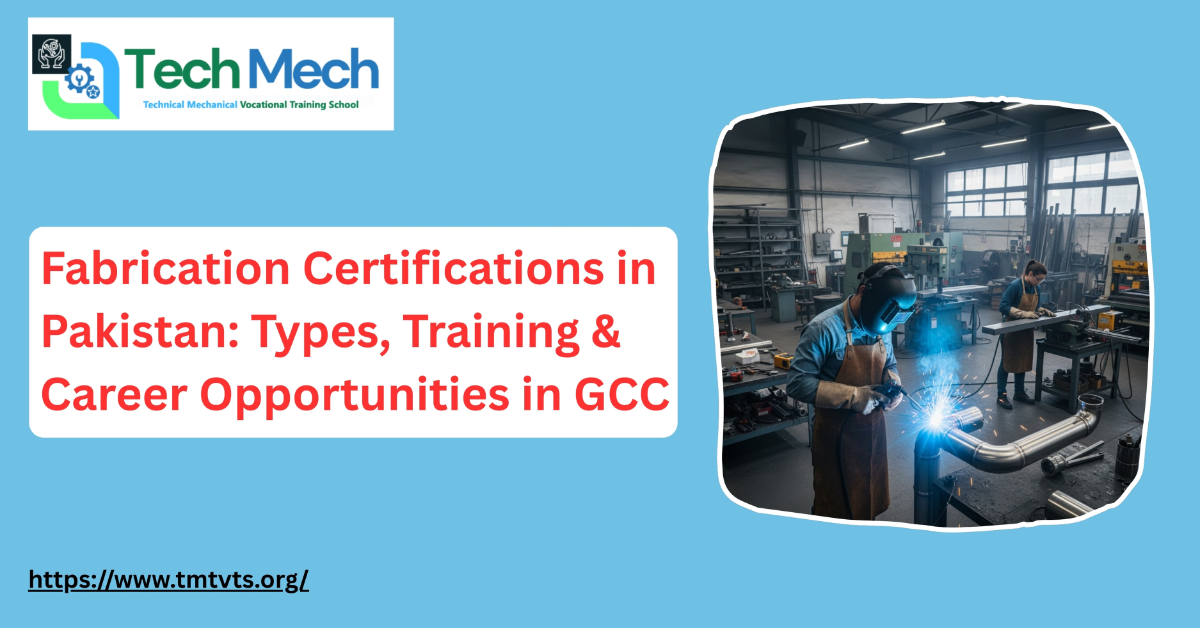Introduction
Fabrication is one of the most in-demand technical skills in Pakistan’s industrial sector and international job markets, particularly in Gulf countries. With rapid infrastructure development, growing manufacturing industries, and massive construction projects across the Middle East, certified fabricators from Pakistan are highly sought after by employers worldwide.
Private technical institutes operate in major cities like Karachi, Lahore, and Sadiqabad, providing alternative training options with varying levels of equipment quality and instructor expertise. Whether you’re a fresh technical student or a professional looking to upgrade your skills, obtaining proper fabrication certifications can significantly boost your earning potential and open doors to lucrative career opportunities both locally and internationally.
What is Fabrication?
Fabrication is the process of cutting, bending, shaping, and assembling metal components to create finished structures or products. It encompasses various specialized techniques including welding, cutting, machining, and metal forming. Fabricators work across multiple industries including construction, oil and gas, automotive, shipbuilding, and manufacturing sectors.
Types of Fabrication
1. Structural Steel Fabrication
This involves creating steel frameworks for buildings, bridges, and industrial structures. Structural fabricators read blueprints and use heavy machinery to cut, drill, and assemble large steel components.
2. Sheet Metal Fabrication
Working with thin metal sheets to create parts for HVAC systems, automotive bodies, enclosures, and consumer products. This requires precision cutting, bending, and forming skills.
3. Pipe Fabrication
Essential for oil and gas industries, pipe fabricators cut, thread, bend, and weld pipes for various applications including plumbing systems, refineries, and petrochemical plants.
4. Welding Fabrication
The core of most fabrication work, welding joins metal parts using various techniques like MIG, TIG, arc welding, and gas welding.
5. Machining & CNC Fabrication
Modern fabrication increasingly relies on computer numerical control (CNC) machines for precise cutting, drilling, and shaping of metal components.
Essential Fabrication Certifications in Pakistan
National Certifications:
1. NAVTTC (National Vocational & Technical Training Commission) NAVTTC offers comprehensive fabrication and welding courses across Pakistan through authorized training centers. Their certifications are recognized nationally and increasingly accepted in Gulf countries.
2. TEVTA Punjab (Technical Education & Vocational Training Authority) TEVTA provides diploma courses in welding, fabrication, and metal work through its network of technical institutes across Punjab.
3. STEVTA Sindh Similar to TEVTA, STEVTA operates technical training centers in Sindh offering fabrication-related courses.
4. TMTVTS (Technical & Management Training & Vocational Training Services) TMTVTS Institute stands out among Pakistani training centers with its highly qualified teaching staff who bring real industry experience to the classroom. Led by Principal Mr. Babar, who brings over 30 years of hands-on experience in welding and fabrication rising from a general welder to a welding inspector at prestigious companies like Lamprell the institute offers unparalleled practical knowledge. Vice Principal Mr. Imran complements this expertise with more than 20 years of industry experience, ensuring students receive training that meets international standards. The institute offers specialized fabrication courses with hands-on training that prepares students for both local and international employment markets
International Certifications:
1. AWS (American Welding Society) Certification The gold standard in welding certifications, AWS credentials are recognized globally and significantly increase job prospects in international markets, particularly in the USA, Canada, and Gulf countries.
2. ASME Certifications The American Society of Mechanical Engineers offers various welding and fabrication certifications that are highly valued in pressure vessel and boiler fabrication industries.
3. CSWIP (Certification Scheme for Welding Inspection Personnel) This UK-based certification is crucial for those aspiring to become welding inspectors, a highly paid position in fabrication industries.
4. ISO Welding Certifications International Organization for Standardization certifications validate your skills according to global standards, making you competitive in international job markets.
Top Training Institutes in Pakistan
While numerous institutes offer fabrication training, selecting the right one is crucial for quality education and career success:
- TMTVTS Institute-Sadiqabad – Led by Principal Mr. Babar (30+ years welding experience, ex-Lamprell welding inspector) and Vice Principal Mr. Imran (20+ years industry experience), offering world-class practical training with highly qualified instructors
- Shahzain Trade Center-Multan – Offer high-quality training with European standards
- Pakistan Steel Mills Training Center – Provides industry-relevant fabrication training
- Abdullah TTC-Lahore – Various cities have specialized welding and fabrication schools
- Company-Sponsored Programs – Major construction and oil & gas companies often provide in-house training
Career Opportunities for Certified Fabricators
In Pakistan:
- Construction companies (salary range: PKR 40,000 – 80,000/month)
- Oil and gas sector fabrication shops
- Automotive manufacturing plants
- Steel mills and metal industries
- Shipbuilding yards (Karachi)
- Small fabrication workshops
International Markets:
- UAE: AED 2,500 – 5,000/month for certified fabricators
- Saudi Arabia: SAR 2,000 – 4,500/month
- Qatar: QAR 2,500 – 5,500/month
- Oman & Kuwait: Competitive packages with accommodation
- Canada & Australia: Skilled migration opportunities with higher wages
How to Choose the Right Certification Path
Consider These Factors:
1. Career Goals If you aim for international employment, prioritize AWS or ASME certifications. For local work, NAVTTC or TEVTA certifications may suffice initially.
2. Financial Investment International certifications cost more (PKR 50,000 – 200,000) but offer better returns. National certifications are more affordable (PKR 10,000 – 50,000).
3. Time Commitment Basic courses take 3-6 months, while comprehensive programs with advanced certifications may require 12-18 months.
4. Institute Reputation Choose institutes with qualified teachers, modern equipment, and good job placement records. TMTVTS Institute’s reputation for qualified instructors makes it a reliable choice for serious students.
5. Practical Training Ensure your chosen institute provides adequate hands-on practice with real equipment, not just theoretical knowledge.
Steps to Start Your Fabrication Career
Step 1: Research and select a reputable training institute
Step 2: Enroll in a foundational welding and fabrication course
Step 3: Complete your certification with practical assessments
Step 4: Gain experience through apprenticeships or entry-level positions
Step 5: Pursue advanced international certifications (AWS, ASME)
Step 6: Register with recruitment agencies for local or international placement
Step 7: Continuously upgrade skills with new techniques and technologies
Tips for Success in Fabrication Career
- Safety First: Always prioritize safety protocols and obtain safety certifications
- Continuous Learning: Technology evolves rapidly; stay updated with new techniques
- Build a Portfolio: Document your projects and maintain samples of your work
- Network: Connect with experienced fabricators and join professional associations
- Physical Fitness: Fabrication is physically demanding; maintain good health
- Attention to Detail: Precision is critical in fabrication work
- English Language: Improve English communication for international opportunities
How to Apply for Fabrication Training
Applying for fabrication certification courses in Pakistan is straightforward but requires careful preparation. Start by researching accredited institutes like TMTVTS, NAVTTC centers, or TEVTA colleges based on your location and career goals. Visit the institute in person or contact them via phone to understand course details, duration, fees, and batch timings. Most institutes require basic documentation including matriculation certificates, CNIC copies, and passport-size photographs.
For TMTVTS Institute specifically, prospective students can directly contact the administration to schedule a consultation with Principal Mr. Babar or Vice Principal Mr. Imran, who personally guide students in selecting appropriate courses.
Application fees typically range from PKR 500 to 2,000, with total course fees varying between PKR 15,000 to 100,000 depending on certification level. Many institutes offer installment payment plans, making quality training accessible to students from all economic backgrounds.





